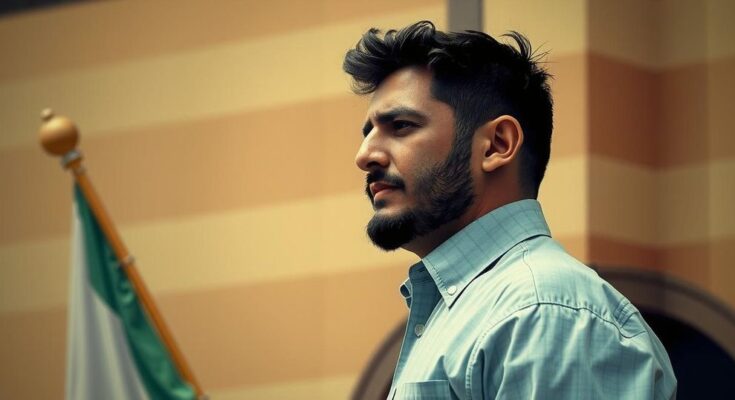Abdul Rahman al-Qaradawi, son of the late Muslim Brotherhood leader, has been extradited from Lebanon to the UAE after facing charges related to public security violations. His extradition follows a court ruling from Egypt that sentenced him for inciting terrorism. The UAE aims to maintain its national security amid rising tensions linked to his political activities against regional regimes.
The United Arab Emirates (UAE) has apprehended Abdul Rahman al-Qaradawi, son of the late Muslim Brotherhood spiritual leader, following his extradition from Lebanon. The state media disclosed that al-Qaradawi had been detained in Lebanon after entering from Syria and now faces charges related to activities that undermine public security. His extradition is part of a broader regional effort against individuals deemed a threat to stability and was influenced by his ties to ongoing tensions in Egypt and Syria.
Lebanon’s governmental decision to extradite al-Qaradawi comes in the wake of an Egyptian legal ruling that sentenced him to five years imprisonment on the grounds of inciting terrorism and opposing the state. The extradition was requested by both the UAE and Egypt, underscoring al-Qaradawi’s significant legal troubles and the serious nature of the allegations against him, which include calls for unrest in the Gulf region.
The UAE has consistently emphasized its resolve to safeguard national security against perceived threats. WAM, the state news agency, highlighted that any individual posing a danger to the UAE’s stability would be pursued rigorously. The arrest was reportedly linked to a video where al-Qaradawi appeared to incite unrest against various regimes, including those in the UAE, Saudi Arabia, and Egypt, perceived as hostile by the Emirati authorities.
Human Rights Watch has voiced concerns regarding al-Qaradawi’s forthcoming trial, suggesting he may face unfair legal proceedings or even torture while in UAE custody. Notably, Abdul Rahman is the progeny of Yusuf al-Qaradawi, a prominent Sunni cleric whose legacy is intertwined with the Muslim Brotherhood’s contentious history in the region, marked by multiple incarcerations and eventual exile in Qatar until his passing in 2022. Abdul Rahman’s political activities include opposition to former Egyptian President Hosni Mubarak, a regime he famously opposed until its fall during the Arab Spring in 2011.
Abdul Rahman al-Qaradawi, as the son of Yusuf al-Qaradawi, embodies a legacy of significant political and social influence within the context of the Muslim Brotherhood. His father was not only a religious authority but also a symbol of resistance against authoritarian regimes in Egypt. The Muslim Brotherhood faces severe repression in countries like Egypt and the UAE, exacerbating the already charged political climate following the Arab Spring. The group’s description as a terrorist organization by various states highlights the precarious position of individuals associated with it, especially those like al-Qaradawi, who are embroiled in controversial political activism.
In conclusion, the extradition of Abdul Rahman al-Qaradawi from Lebanon to the United Arab Emirates underscores the intricate interplay of regional security concerns and the contentious legacy of the Muslim Brotherhood. His arrest reflects broader efforts by Gulf states to combat perceived threats to stability, while human rights advocates remain wary of the implications for due process and individual rights in the UAE. This situation epitomizes the ongoing struggles within the region regarding governance, civil rights, and political dissent.
Original Source: www.newarab.com




